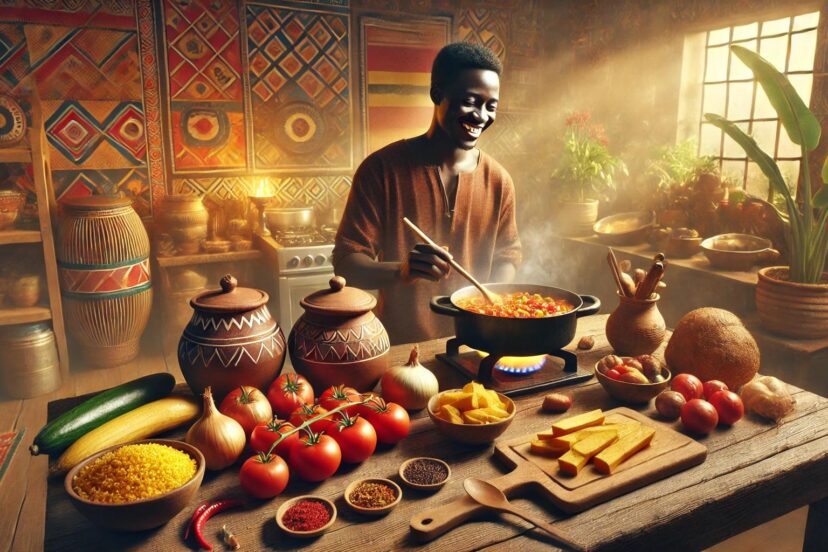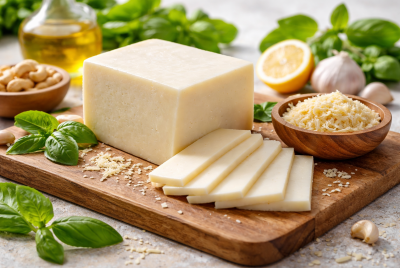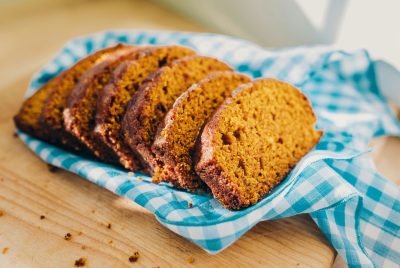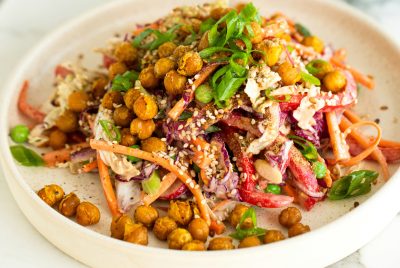African Food and Recipes: Flavors of Africa
We may earn a commission for purchases made using our links. Please see our disclosure to learn more.
Hey there, foodies! Do you dare to try some delicious and flavorful meals you’ve never tasted before? I’ve got you covered! African cuisine is a dish rich in culture and tradition. It’s been enjoyed by families and communities for years. From the buzzing energy of Lagos’ markets to the peaceful rhythm of village kitchens in Morocco, African food speaks a language that goes beyond taste—it connects, nourishes, and celebrates. In this guide, we’ll travel the world and learn about African food and recipes that will blow your mind.
What Makes African Food Special?
I believe every dish, wherever it came from, is special. But, there’s something about their food recipes that caught my attention. African food and recipes are like a symphony of flavors, textures, and techniques. It really reflects the land’s sheer diversity! Fan of curries? East Africa got you covered. Have a heart for stews? Then West Africa is the place to be. But no matter the region, every dish is rooted in the earth and the people, embodying their stories and heritage. Every bite speaks to how rich their culture is!
Health Benefits of Traditional African Foods
African cuisine not only offers incredible flavors but also significant health benefits. Studies highlight the nutritional potential of traditional African foods. For instance, research shows that African leafy vegetables are rich in antioxidants, which play a crucial role in promoting health and preventing diseases. Additionally, African fermented foods have been recognized for their probiotic properties, supporting gut health and overall well-being. Exploring African recipes can be both a delightful and nutritious choice.
The Staple Foods of Africa
African cuisine is made up of humble yet powerful staples like Ugali and Injera. Maize, millet, sorghum, rice, and cassava are the building blocks of countless meals across the continent. You’ll literally find it in almost every dish they cook! Most locals love to eat Ugali or Posho (a maize-based dish). Why? Simply because it’s dense, simple, and utterly comforting. It tastes like more of a popcorn than grilled corn which is delicious! Or Pap, its Southern cousin, bringing people together around communal bowls. Millet and sorghum have their own stories to tell, particularly in West Africa, where they’ve sustained communities for centuries.
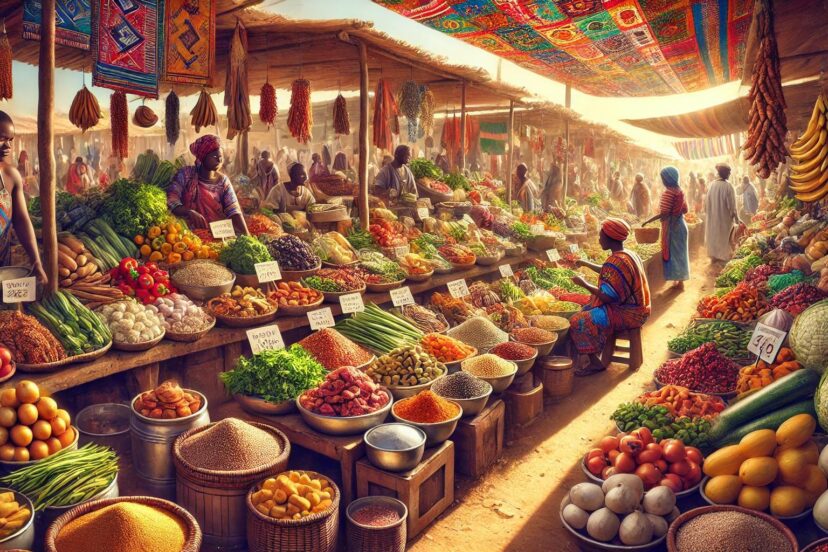
The Role of Spices in African Cooking
African love spices like cumin, bay leaves, and cinnamon. I think that’s what makes their dishes more flavorful. They infuse African food and recipes with warmth, complexity, and that little something that makes you close your eyes when you take a bite. Mmm… yummy! Did you know that Ras el Hanout is North Africa’s magic dust? Yep. It’s packed with the whispers of saffron, cumin, and cinnamon. In East Africa, they mix coconut milk with cinnamon and cloves, creating dishes that are both sweet and savory.
Iconic Dishes from West Africa
So, what are the iconic dishes from Africa? Well, in West Africa, the food is bold, hearty, and meant to be shared just like their Jollof Rice! If you haven’t tried it yet, you should!!!. This one-pot wonder, brimming with tomatoes, onions, and spices, is the star of any gathering. It can be paired with a side dish or a main, your choice. Then there’s Suya, spicy meat skewers that bring the party to the streets. Grilled to perfection, the smoky flavor mixed with a peanut-spice coating is enough to make you wonder why you didn’t discover it sooner.
Recommended Products for African Cooking
Ready to cook iconic African food and recipes? These are the essentials you need that can enhance the authenticity and flavors of the dishes you prepare:
- Ras el Hanout – A North African spice mix commonly used in Moroccan and Algerian cooking, perfect for stews like Tagine.
- Berbere Spice – An Ethiopian spice blend that adds heat and complexity to dishes such as Doro Wat and Misir Wot.
- Hibiscus Flowers (for Bissap) – Used to make a refreshing West African drink known as Bissap or Zobo.
- Couscous – A versatile North African staple grain used in many dishes like Moroccan Couscous.
- Plantain – Common in West and Central African cooking, plantain is fried, baked, or boiled as a side dish or snack.
- Cassava Flour – Ideal for making Fufu or other African side dishes. It’s a gluten-free alternative used in various African cuisines.
- Palm Oil – A key ingredient in many West African dishes like Egusi Soup and Jollof Rice, known for its distinctive red color and rich flavor.
- Peanut Butter – Essential for dishes like Groundnut Stew, a West African favorite.
- Coconut Milk – Used in East African and Swahili cuisine to add creaminess to curries and stews.
- Tamarind Paste – A souring agent used in West African and North African cuisines to add tangy notes to dishes like Senegalese Yassa.
East African Delights
East Africa’s culinary landscape blends African traditions with the spices of the Indian Ocean and the flavors of the Middle East. Imagine sitting around a fire, the smoky scent of Nyama Choma (grilled meat) filling the air, as you laugh and share stories with friends. Wow, just the thought of that makes me hungry right now lol. Or consider Ethiopia’s Injera… A tangy, spongy flatbread that’s both food and a utensil. Then scoop up hearty stews like Doro Wat, spicy and comforting all at once. Delicious!!!
North African Cuisine: A Fusion of Flavours
Let’s talk about North African cuisine. On this side of the country, dishes dance with flavors—delicate, but with depth. A popular dish among locals is the Tagine. It’s a slow-cooked stew made with tender meat or vegetables with the sweetness of dried fruits, the crunch of nuts, and the warmth of saffron and cinnamon. One bite, and you’re transported to the colorful streets of Marrakech, where every meal feels like a story being told. Sweet and spicy at the same time!
Southern African Comfort Foods
Ready to go South? Alright. Southern Africa is all about comfort. Ever tried Bunny Chow? Not yet? It’s basically a loaf of bread hollowed out and filled with rich and spicy curry. Yeah, it’s a bit messy, I won’t lie. But it’s hearty! Perfect kind of meal on a cold day. Or try Biltong. A thinly sliced dried meat that’s as much about tradition as it is about flavor—a snack that tells the tale of perseverance and resourcefulness.
Vegetarian and Vegan Options in African Cuisine
If you think that African cuisine is all about meat. You’re wrong. Nature’s bounty shines in dishes that are naturally vegan or vegetarian, like West Africa’s Egusi Soup. This yummy soup is made with ground melon seeds and leafy greens. And in Ethiopia (thanks to religious fasting traditions) you’ll find an array of plant-based delights like Misir Wot. Misir Wot is a spicy lentil stew that’s full of depth and richness without needing a trace of animal products. Great options for vegans!
How to Bring African Flavours to Your Kitchen
Cooking African dishes is all about simplicity even though they use lots of spices. They use fresh ingredients, straightforward techniques, and bold flavors. So if you want to explore and cook authentic African meals, start small. How about a pot of Jollof Rice or a fragrant Moroccan Couscous? That’s a good start, folks. Don’t rush—African dishes often take their time, simmering and bubbling until the flavors have melded together in perfect harmony. If you can, go to an African restaurant to try them first before you cook at home.
The Importance of Community in African Food
In African culture, food is all about connection. Meals are rarely eaten alone. After all, meals taste better when shared with family or friends, right? Whether it’s Ugali being shared at a family gathering or a communal dish of Injera laid out for everyone to dig into, the act of eating together is a moment of unity. It’s their way to bond together and I think that’s lovely. It’s in these moments, around the table or the fire, that stories are told, bonds are strengthened, and memories are made. Why don’t you try it yourself? Share a meal with your people and make good memories too!
Exploring African Street Food
Do you love street foods? Well, I do!!! Street food is where you get to feel the heartbeat of a place and Africa is no exception. Imagine strolling through the bustling streets of Lagos, where vendors offer you deep-fried Puff-Puff—crispy on the outside, soft and fluffy inside. Or maybe you’re in Nairobi, biting into a hot Sambusa, the spicy, savory filling bursting with flavor. These aren’t just snacks—they’re little moments of joy on a busy day. If you haven’t been to Africa, watch YouTube videos about it to have the feels of what it’s like!
The Health Benefits of African Food
African food is not only yummy but they’re healthy too! Dishes like Ndolé, a Cameroonian spinach and peanut stew, are loaded with vitamins and nutrients. Have you tried that yet? And staples like Fufu (made from cassava or plantain) provide the energy needed for long days of work. Even the spices—ginger, turmeric, garlic—aren’t just there for flavor; they bring health benefits like anti-inflammatory properties, making each meal not just a treat for the taste buds but for the body too. Remember, eat healthy to stay healthy!
African Food for Special Occasions
Just like any other country, Africa loves celebrations too. And food will definitely not miss the occasion! In Ghana, weddings feature dishes like Fufu and Light Soup, while in Morocco, family gatherings wouldn’t be complete without a huge plate of Couscous. These dishes are all about honoring traditions, showing love, and bringing joy. Eating and dancing? Africa got you covered!
Adapting African Recipes for a Modern Kitchen
Intimidated by African food and recipes? You don’t have to. Many can be easily adapted to modern kitchens and diets. Gluten-free? Sure! You can still enjoy Injera with the right substitutions. Prefer something lighter? Alright. Swap the meat in your Tagine for tofu or fish. African cuisine is as flexible as it is flavorful. You just need the right alternative to keep it authentic.
African Desserts: A Sweet Ending
Now who likes desserts? I do! No meal is complete without something sweet, right? African people enjoy simple yet satisfying desserts. One good example is Chin Chin, West Africa’s crunchy fried dough, perfect for munching on while sipping tea. Oh, and try South Africa’s Malva Pudding. It’s sticky, sweet, and the perfect end to any meal.
Cooking African Food on a Budget
Don’t let the bold flavors fool you—African cuisine can be incredibly budget-friendly. Ingredients like rice, beans, and vegetables are often the stars of the show. Dishes like Githeri (a Kenyan corn and bean stew) or Chakalaka (a South African vegetable relish) prove that you don’t need fancy ingredients to create something spectacular.
African Drinks to Complement Your Meal
A great meal calls for a great drink. In West Africa, Bissap (hibiscus tea) refreshes and cools you down. While in Ethiopia, the famous coffee ceremonies remind us that sometimes, life’s best moments happen over a warm cup. Oh, not a fan of coffee? No worries… drink tea! Don’t miss out on Rooibos, the earthy, soothing tea from South Africa.
Learning More About African Food Through Travel
If you’re really serious about experiencing African food and recipes in its full glory, there’s no substitute for travel. I mean, you can taste and experience the authenticity out there. Walking through a local market in Ghana or sitting down for a family meal in Ethiopia will teach you more than any recipe ever could. And the people? They’re welcoming too. You’ll learn about their culture firsthand. Each region has its own soul, and tasting the food firsthand brings you closer to that essence.
Summary
African food and recipesares a vibrant, diverse world waiting to be explored. It can be intimidating at first, but with the right substitute, you can never go wrong. From dishes like the Jollof rice to a sweet dessert like Malva pudding, there’s a dish for everyone. And while some of the recipes may seem unfamiliar, they’re often easy to recreate at home. So, go on—take a bite, and let the journey begin. Why not book a flight and travel there for an exciting experience?
FAQs About African Food and Recipes
1. What is the most popular food in Africa?
Jollof Rice reigns supreme, especially in West Africa. It’s the life of the party—literally, you’ll find it at every celebration!
2. Can I make African food with ingredients I find locally?
Absolutely! Most African recipes use ingredients you can easily find in supermarkets. For some unique flavors, you might need to hit up an international market, but don’t worry—substitutes work just as well in a pinch.
3. Is African food spicy?
It can be, but it doesn’t have to leave your mouth on fire. Many dishes just use spices for flavor, not necessarily heat. And hey, you can always dial down the spiciness to suit your taste buds.
4. What’s a good African dish for beginners to try?
I’d say start with Jollof Rice or a simple Moroccan Couscous. Both are easy to whip up and don’t require too many exotic ingredients.
5. Are there vegan options in African cuisine?
Yes! Lots of African dishes are naturally vegan. You’ll find grain, vegetable, and legume-based dishes aplenty, especially in places like Ethiopia and West Africa.

